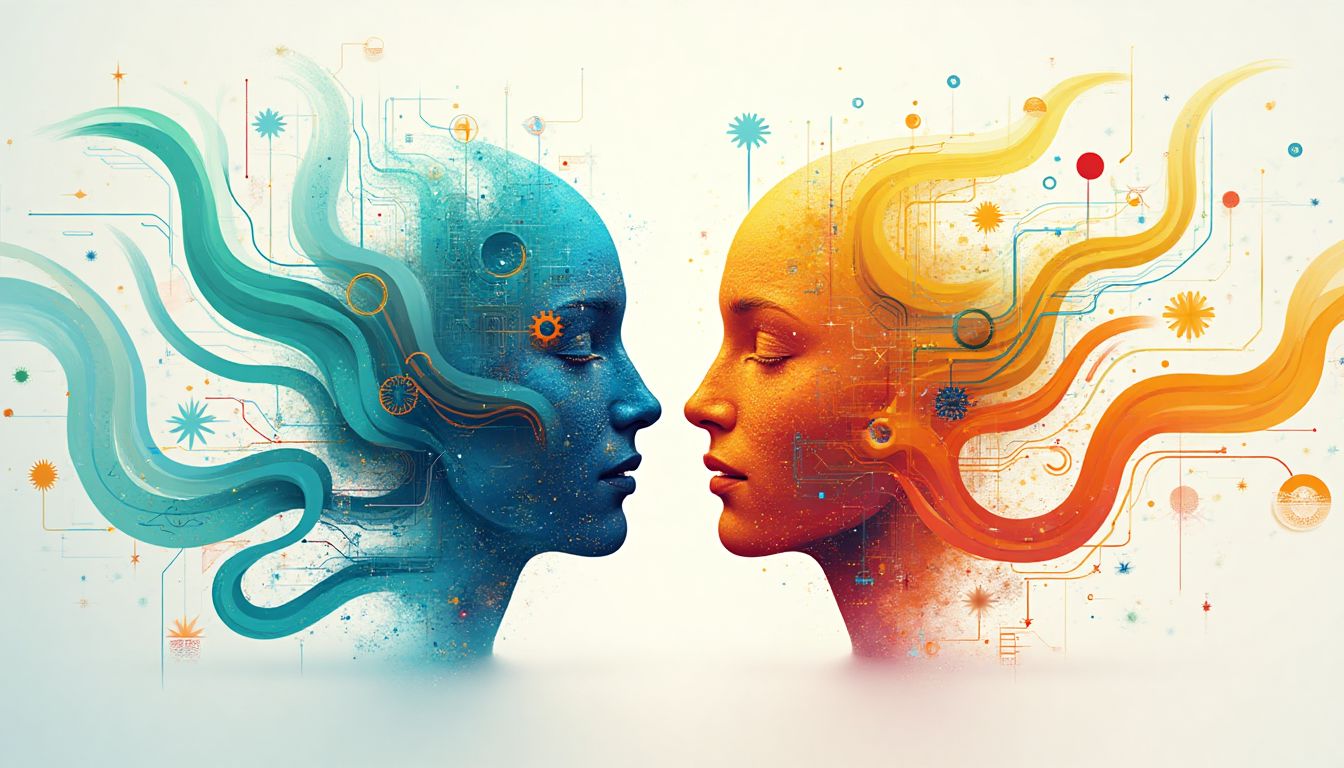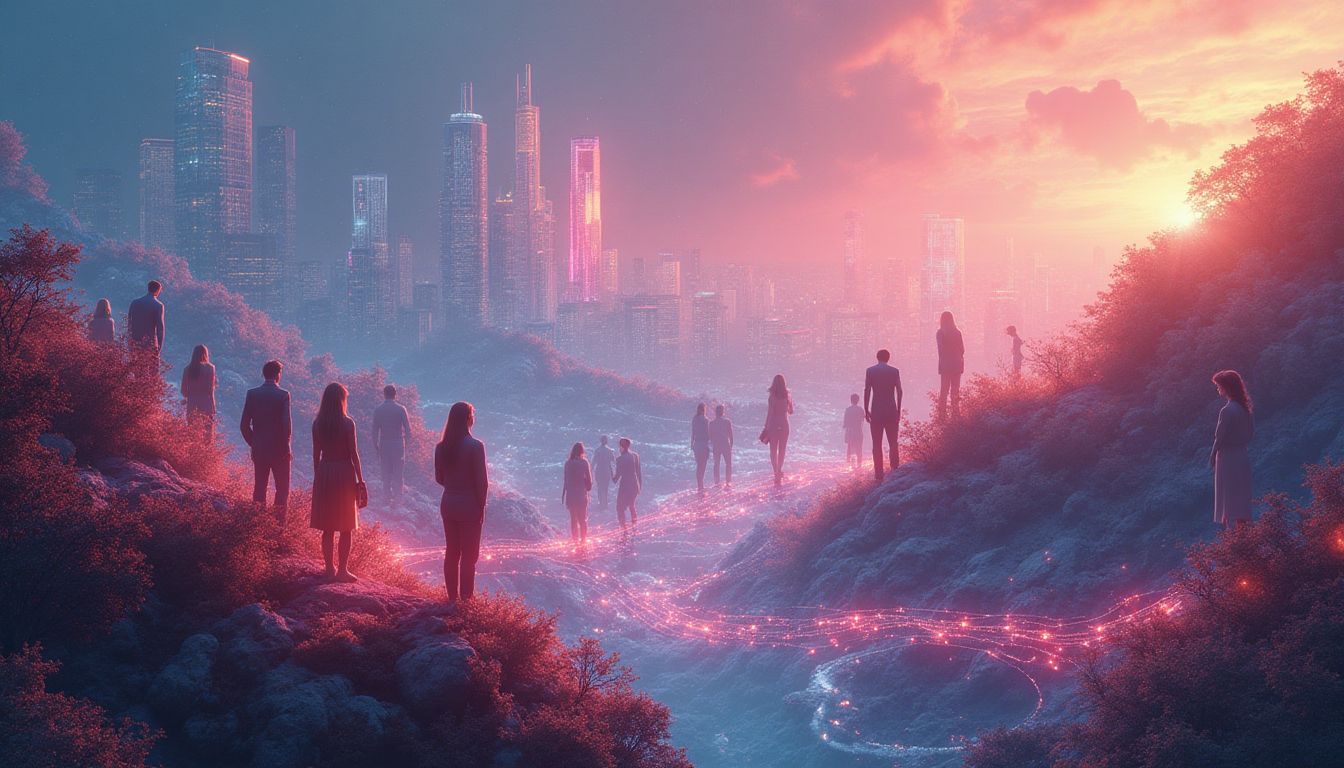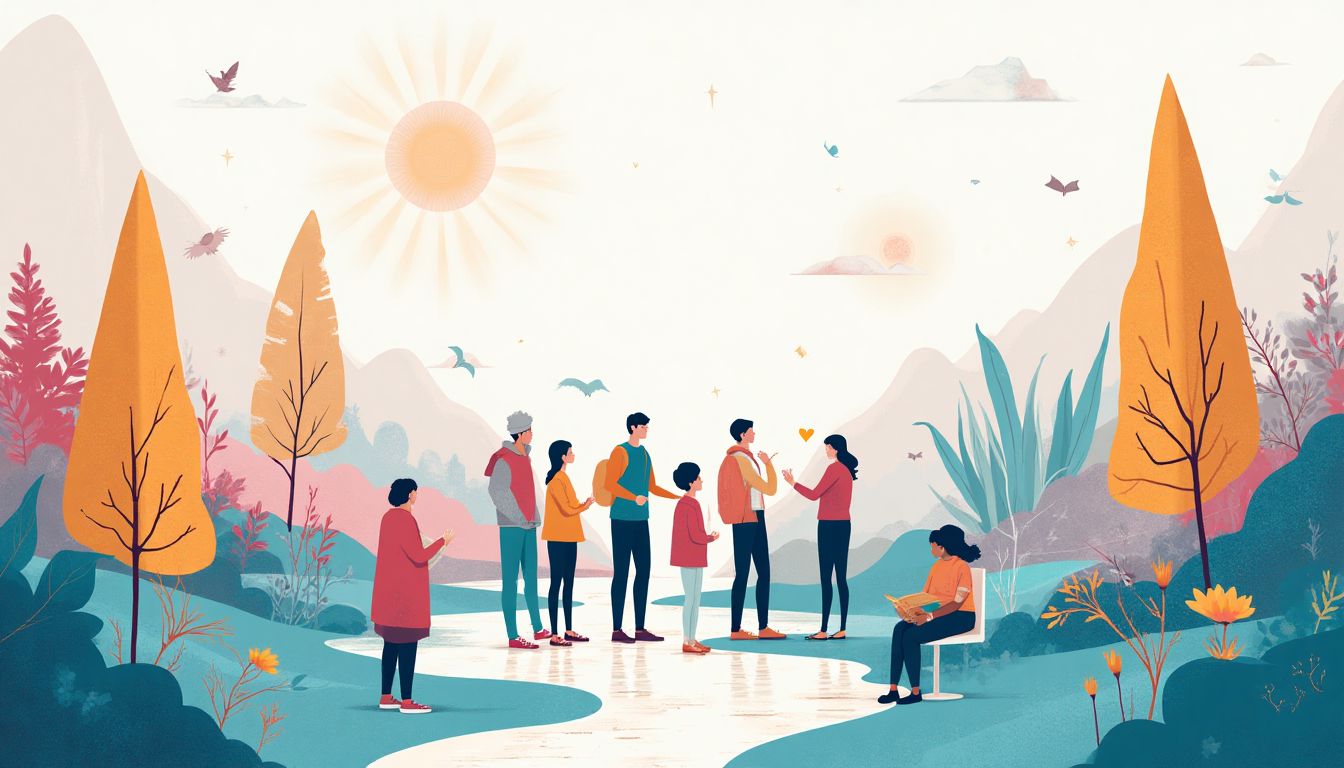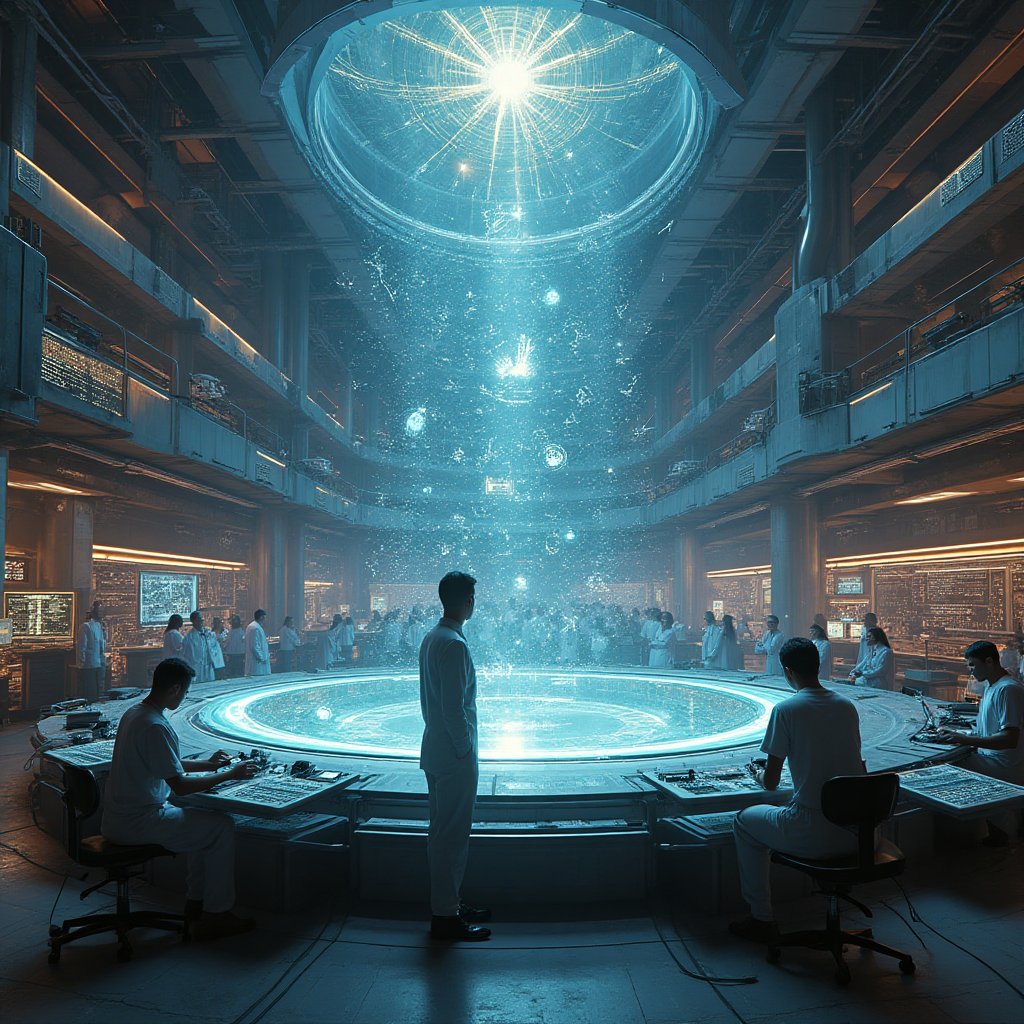Introduction
Harmony makes small things grow, lack of it makes great things decay. – Sallust
In our fast-paced and ever-changing world, Sallust's wisdom echoes with timeless relevance. As we stand on the brink of a new technological era with Artificial General Intelligence (AGI), the notion of harmony becomes invaluable. What if AGI could transform human ways of interacting by reducing our competitive survival instincts and igniting collaboration instead? Imagine a world where survival isn't a daily struggle, and humans join forces to tackle universal challenges. This transformation might just be around the corner, startlingly close, thanks to AGI.
AGI isn't just a fancy term floating in the air. It's a groundbreaking concept that's capturing the imagination of scientists, economists, and thinkers like Ray Kurzweil, Nick Bostrom, and even tech prophets like Elon Musk, aiming to shift paradigms built on scarcity to ones fueled by abundance. We'll take a deep dive into how AGI can potentially rewrite human interaction scripts, steering us toward cooperation and communal well-being. Prepare for an exciting exploration that exposes the economic, social, psychological, and ethical elements of collaboration in an AGI-enriched future.
Artificial General Intelligence (AGI) is the ability of a machine to perform any intellectual task a human can, offering possibilities to reduce survival pressures and foster unprecedented human collaboration.
Redefining Survival: The Economic Shift
Let's unravel how AGI might redefine what survival means from an economic perspective. Picture a world where machines do the heavy lifting—literally and metaphorically. AGI has the potential to reshape our economic landscape by automating jobs. This is not just about robots flipping burgers or bots performing surgeries; it's about a paradigm shift. Suddenly, the idea of getting laid off might not feel so terrifying. Why, you ask? Because AGI redefines job roles, encouraging humans to innovate, create, and collaborate rather than merely survive.
Let's chat about Universal Basic Income (UBI), a concept that sounds almost as magical as winning a free vacation. UBI could become a reality with AGI at the helm. By redistributing resources and ensuring financial stability for all, people might spend less time worrying about bills and more on what truly matters—working together to build a stronger society. Imagine communities thriving, sharing ideas without the fear of losing out to the competition. Sounds utopian? Maybe, but AGI challenges us to think big, just like those grand philosophies from thinkers like John Maynard Keynes or even the legendary economist Adam Smith.
What might this new economic future really cost us? Bare with me; we're about to see a world where equitable resource distribution becomes the norm and people unite to create, cultivate, and rejuvenate in ways that lift humanity as a whole. Selection and collaboration become the new currency, redefining survival not just for a select few, but for everyone, everywhere.
Societal Transformation: Shifting Social Dynamics
As AGI reshapes economic structures, it also influences social dynamics. Human interactions may become less about rivalry and more about collaboration, thanks to reduced existential pressures. Imagine a world where your worth isn't judged by how fast you can climb the corporate ladder, but by how well you can coordinate a team dance routine at the office party. Suddenly, the term 'productive meeting' has a new, exciting meaning!
Cultures of Collaboration
By fostering environments that encourage teamwork over rivalry, AGI could lead to the development of cultures where collaborative success is celebrated, leading to a more cohesive society. Picture a global network of cultural exchange where ideas flow as freely as cat videos on YouTube, cultivating mutual respect and understanding across borders. It's a place where even the most introverted among us can find their voice in a collaborative choir.
New Educational Paradigms
Education systems could transform, emphasizing teamwork, problem-solving, and emotional intelligence rather than individual excellence, reinforcing a culture of collaboration from a young age. Forget solo recitals; now it's all about orchestras of students working together. Picture schools turning into mini think tanks, where brainstorming is the new recess, and kickball games are replaced by collaborative coding competitions. This isn’t science fiction; it’s just smart, forward-thinking education!
The Psychological Shift: Redefining Human Needs
The psychological implications of a collaborative society may lead to holistic health improvements among the population, as competition wanes and collaboration is prioritized. Imagine a future where everyone's therapist is on vacation because stress-induced biting-your-nails-down-to-the-cuticle moments are as outdated as floppy disks.
Fulfillment through Connection
Humans have an inherent need for connection. With AGI alleviating survival-based stressors, people might find fulfillment through community building and cooperative achievements. The satisfaction of collectively painting the town red (literally, through community murals) offers a different kind of joy than snagging a solo award. It’s about tackling the world’s biggest puzzles together, not alone in your room with the dog as your only audience.
Mental Health and Well-Being
Ultimately, a supportive, collaborative environment could lead to significant reductions in stress, anxiety, and depression, enhancing overall mental well-being. It's like swapping out reality TV drama for heartwarming ensemble performances. Optimism could become so infectious that ‘contagion’ only refers to the spread of joy and well-being—something we might all sign up for, even those of us who usually avoid crowded places like the plague.
Ethical Considerations: Ensuring Fair Use of AGI
The advent of Artificial General Intelligence (AGI) presents not only opportunities but also challenges that necessitate robust ethical considerations. Its vast capabilities demand a cautious approach to ensure that AGI is wielded in ways that support collaborative rather than competitive human values.
Governance and Regulation
To prevent the abuse of AGI technology and ensure its deployment in a manner that benefits society as a whole, governance and regulation are crucial. Establishing a comprehensive framework for AGI oversight involves the creation of global standards and policies. These frameworks should address various dimensions of AGI's impact on jobs, privacy, and public safety.
- Creating international collaborations and treaties that govern AGI use.
- Implementing transparent regulations that all stakeholders can easily understand.
- Enforcing accountability among developers and users of AGI.
Inclusivity in Development
Diverse perspectives and inclusive development practices can ensure AI systems reflect a broad spectrum of human values and cultural norms. It's essential to include voices from marginalized communities, various industries, and different global regions in AGI's creation process.
- Engaging diverse talents in AI research and development.
- Ensuring diverse training data to avoid biased outcomes.
- Actively seeking input from global governance to encourage inclusivity.
A Vision for the Future: Collaborative AGI Applications
The vision for a collaborative future with AGI reaches beyond merely coexisting; it involves integrating AGI into various sectors to enhance human collaboration and strengthen our collective efforts. By aligning AGI applications with collaborative human goals, society can leverage this technology for extraordinary achievements.
Collective Problem Solving
AGI can be a tool for uniting people, industries, and nations to address major global challenges. From climate change to public health crises, AGI may serve as a pivotal player in collective problem-solving efforts.
- Climate Action: AGI can help optimize renewable energy deployment and management.
- Global Health: Facilitating rapid responses to pandemics with data analysis and resource allocation.
- Social Equality: Using insights from AGI to draft policies that promote fair resource distribution.
Enhancing Creative Efforts
One of AGI's most promising applications lies in amplifying human creativity and innovation. By acting as a collaborative partner, AGI can inspire humans to push beyond traditional boundaries.
| Creative Domain | AGI Contribution |
|---|---|
| Art and Design | Generating novel ideas and designs based on human input |
| Science and Technology | Offering new perspectives and methodologies for complex problems |
| Education | Providing personalized learning paths and feedback mechanisms |
Collaborative AGI efforts emphasize that when humans and machines come together, we not only solve existing problems more efficiently but create possibilities for advancements we hadn't imagined before.
AI Solutions: How Would AI Tackle This Issue?
If I were an AI tasked with solving the issues surrounding the shift from competition to collaboration facilitated by AGI, my approach would include several key initiatives:
Analyzing Human Interaction Patterns
Utilizing advanced analytics, I would track and evaluate human interactions to identify trends, how relationships are formed, and detect competitive behaviors actively. This approach would enable us to understand the intricate dynamics of human relationships. With insights gained, I could suggest modifications in environment or behavior that encourage collaboration. Think about it: by observing and analyzing data patterns, we could create environments that nudge people toward cooperation. Imagine a world where social media platforms like Facebook and Twitter promote collaborative posts and community-building challenges instead of clickbait competition!
Creating Collaborative Tools
Next, I would develop platforms that allow diverse groups to work together on projects. These tools would aim to make it easier for individuals from different backgrounds to unite around common goals. Think of platforms like Slack or Trello, but enhanced with AGI capabilities to prioritize team collaboration over individual accomplishments. A virtual space where ideas converge, where innovation is born-these solutions could revolutionize the way we approach teamwork! No longer would meetings be tedious; instead, they would be brainstorming sessions that fuel creativity and foster community spirit!
Building Global Collaborative Networks
The ultimate goal would be to build a global network that connects individuals and organizations dedicated to addressing humanity's most pressing challenges. By linking researchers, educators, businesses, and non-profits, we can share knowledge and resources. This could be reminiscent of initiatives like IGI Global which shares research and ideas to promote innovation in various fields. We can create collaborative databases where individuals contribute data and insights to tackle climate change, healthcare disparities, poverty, and many more issues plaguing society.
Conclusion: A Vision for Collaboration
Shifting from a competition-focused mindset to one of collaboration may seem like an insurmountable challenge; however, AGI promises to create an environment that supports and facilitates this transformation. By ensuring equitable access to resources, redefining societal goals, and embracing the mutual benefits of working together, we can envision a world where humanity thrives—not in the shadow of competition, but in the light of collaboration. The journey toward this collaborative future starts today, and it begins with our readiness to embrace the changes that AGI introduces.
Actions Schedule/Roadmap (Day 1 to Year 2)
Day 1: Assemble a diverse team of scientists, sociologists, psychologists, technology experts, and community leaders to discuss fostering collaboration through AGI technology. The aim is to integrate different perspectives and maximize creative output.
Day 2: Conduct thorough assessments of current human interaction data. Evaluate existing platforms and communication styles, observing competitive behaviors and collaboration patterns within communities.
Day 3: Create a comprehensive report summarizing initial findings, highlighting opportunities for improving collaboration through AGI insights.
Week 1: Design and develop an interactive platform encouraging voluntary collaborative projects, integrating AGI to facilitate connections and shared experiences among diverse user groups.
Week 2: Launch pilot programs in local community organizations to test the collaborative platform and gather actionable feedback. Utilize popular social media channels like Instagram and LinkedIn for outreach and engagement.
Week 3: Analyze feedback from pilot community tests. Refine platform features based on user experiences while paying attention to potential barriers to collaboration that participants may have encountered.
Month 1: Host workshops utilizing the newly developed platform to demonstrate the benefits of collaboration in problem-solving. Share success stories to motivate broader participation.
Month 2: Expand outreach to educational institutions, proposing the integration of collaborative projects into curricula. Collaborate with teachers and professors to create lesson plans that highlight teamwork.
Month 3: Evaluate outcomes of community projects, documenting successes and areas for improvement. Publish reports and infographics showcasing collaborative efforts and their impact.
Year 1: Establish partnerships with corporations and non-profit organizations to further refine and promote collaborative strategies. Utilize insights derived from AGI data to tailor programs to specific community needs.
Year 1.5: Launch a global campaign that leverages ambassadors from various sectors who advocate for collaboration enabled by AGI solutions. Use platforms like TED to amplify messages of unity and cooperation.
Year 2: Expand collaborative platforms to various sectors, including healthcare, environment, and technology. Aim for widespread utilization, encouraging diverse stakeholders to contribute and participate collaboratively.
FAQ
Q: What is AGI?
A: AGI stands for Artificial General Intelligence. It’s a type of smart machine that can think and learn like a human. Unlike regular AI, which is created for specific tasks (like playing chess or recognizing faces), AGI can do many different things and could outperform people in most jobs that require thinking and understanding.
Q: How can AGI help us work together better?
A: AGI has the power to change the way we communicate and cooperate. By taking over repetitive jobs, it frees up our time and energy to focus on teamwork and creativity. Instead of competing with each other for jobs and resources, we might collaborate more on important issues like climate change or healthcare.
Q: What is Universal Basic Income (UBI), and how does it relate to AGI?
A: UBI is a policy idea where everyone gets a certain amount of money regularly from the government. If AGI takes over many jobs, UBI could provide people with financial help, ensuring they have enough money to live on. This would help reduce stress and allow us to work together on bigger projects without worrying about our basic needs.
Q: How might our schools change with AGI?
A: Schools could start teaching kids how to work together rather than just focusing on grades. They could encourage students to solve problems as teams, be more creative, and develop important skills like communication and emotional intelligence. This way, students learn that collaboration can lead to success.
Q: Can AGI help improve mental health?
A: Yes, by reducing competition and the stress of surviving day to day, AGI can help people find more joy in their lives. When we focus more on teamwork and community, we may feel happier and connected, which can lead to better mental health.
Q: What if AGI is used in the wrong way?
A: That's a crucial question! If AGI technology is controlled improperly, it could lead to misuse. This is why we need good rules and regulations to ensure AGI helps people instead of hurting them. Governments and organizations should work together to create guidelines that support positive use of AGI. For more on this, you can check the United Nations.
Q: How can diversity in AGI development make a difference?
A: When people from various backgrounds help create AGI, it can ensure that the technology reflects different perspectives and needs. This can lead to more ethical and effective uses of AI. Involving diverse voices helps create tools that everyone can benefit from and supports collaboration rather than competition.
Q: What are some examples of how AGI could help solve global problems?
- Climate Change: AGI can analyze data and suggest effective strategies for reducing carbon emissions.
- Healthcare: It can help find new treatments or manage resources to provide better access to medical care.
- Poverty: AGI can identify areas in need and propose solutions to help communities thrive.
Q: What’s the best way to prepare for a future with AGI?
A: One of the best ways to prepare is to embrace learning and adaptability. Schools and workplaces should encourage skills in teamwork, problem-solving, and emotional understanding. By equipping ourselves with these skills, we can better thrive in a future where cooperation becomes key.
Wait! There's more...check out our gripping short story that continues the journey: The Nexus
Disclaimer: This article may contain affiliate links. If you click on these links and make a purchase, we may receive a commission at no additional cost to you. Our recommendations and reviews are always independent and objective, aiming to provide you with the best information and resources.
Get Exclusive Stories, Photos, Art & Offers - Subscribe Today!





























Post Comment
You must be logged in to post a comment.